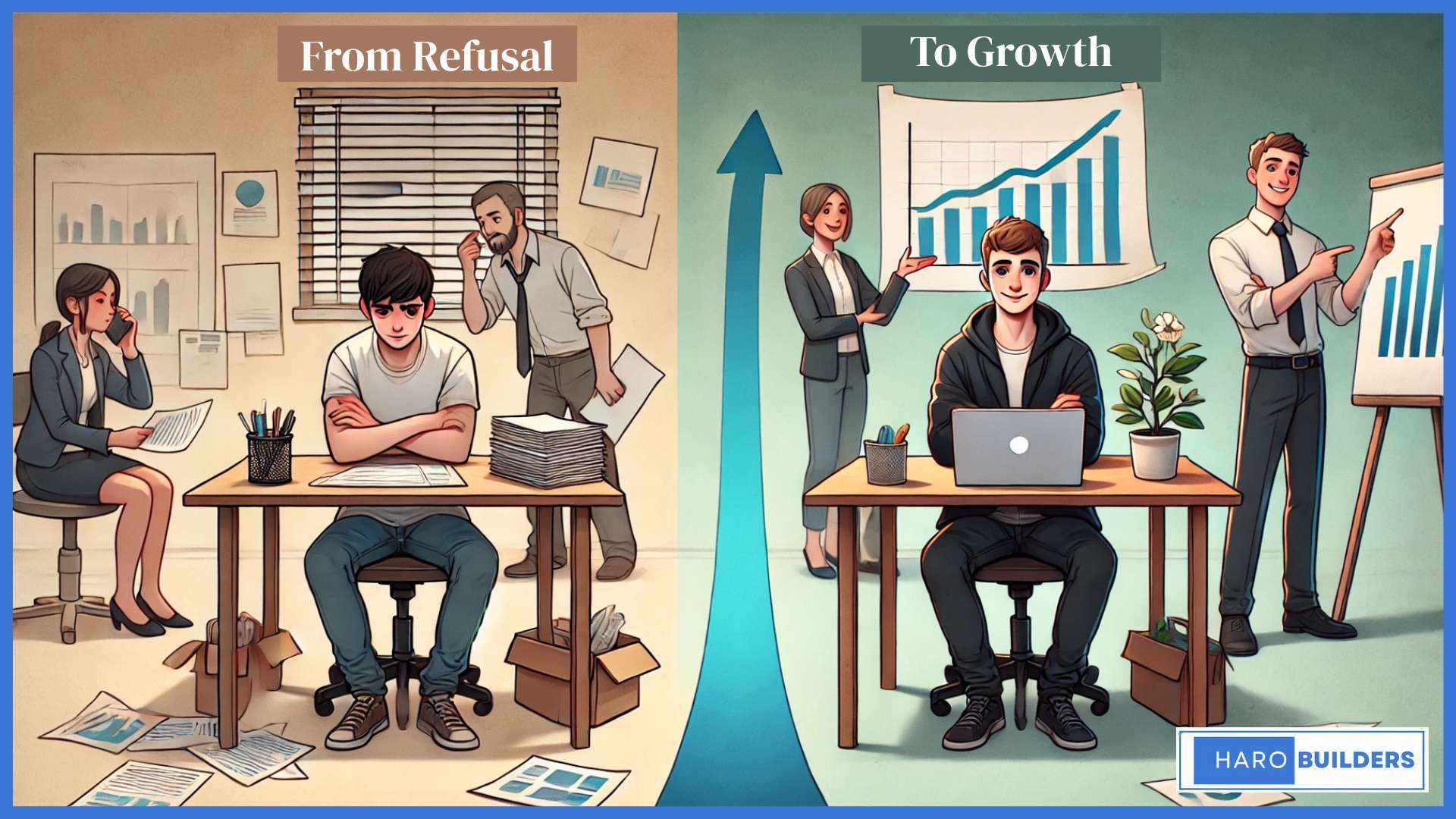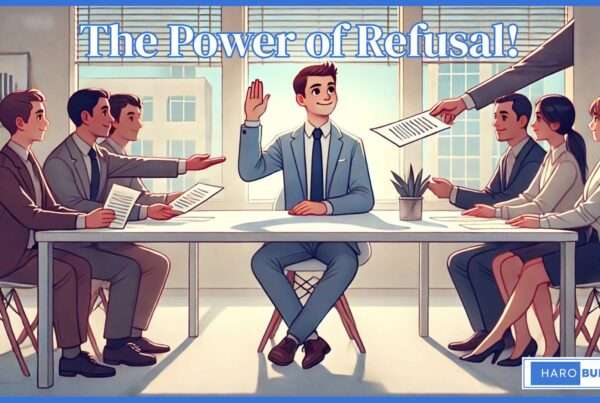
Introduction
In the world of entrepreneurship, founders often find themselves at a crossroads, having to decide whether to pursue every opportunity that presents itself or stay focused on their original mission. While the pressure to scale quickly or diversify may seem appealing, many leaders have learned that the journey from Refusal to Growth begins with saying no to the wrong opportunities. This deliberate choice not only protects their vision but also leads to stronger, more sustainable success in the long term.
This article highlights the journeys of several founders who made the tough decision to refuse tempting offers. By staying true to their core values and long-term goals, they have built businesses that have withstood the test of time. Through their stories, we learn how refusing opportunities that don’t align with their vision helped them create lasting success.
The Importance of Staying Focused and Protecting Your Vision:
One of the biggest challenges founders face is staying focused on their vision amid countless opportunities that may seem tempting. While diversifying or expanding quickly can appear to be the easiest path to growth, it often leads to a loss of identity and mission.
- Staying focused on the core mission allows a business to grow organically.
- Saying no helps prevent distractions that can derail long-term goals.
Louis Ducruet, the Founder and CEO of Eprezto, faced this dilemma early in his company’s journey. He recalls,
“At one point, a broker advised us to add a more traditional sales component with agents and brick-and-mortar offices. We said no.”
Despite initial pressure, Louis and his team chose to stick to their online-only model, which, while modest in the early days, allowed for sustainable growth. By avoiding distractions that didn’t align with their vision, they were able to build a compounding growth curve and scale successfully.
Protecting the Core Brand Promise:
For many entrepreneurs, saying no isn’t just about rejecting opportunities—it’s about protecting the core brand promise. Aligning with companies or partnerships that don’t fit your values or vision can undermine everything you’ve worked to build.
- Partnerships that deviate from your brand promise often lead to compromised integrity.
- Staying true to your values builds trust with customers, employees, and partners.
Mac Steer, the Owner & Director of Simify, found himself in a situation where a major mobile network provider offered a lucrative partnership. However, the provider’s business model didn’t align with Simify’s promise of transparency and no hidden fees. Mac explains,
“Adopting their structure would mean abandoning the very problem we set out to solve for travelers. We would just be another company selling confusing, expensive travel SIMs.”
By saying no to the deal, Simify preserved its brand’s core values and ultimately built a reputation for reliability and transparency, leading to explosive organic growth.
The Power of Integrity in Business Decisions:
Integrity is one of the most valuable assets a business can possess. Founders who prioritize integrity over financial gain tend to build more lasting relationships with customers, employees, and investors.
- Staying true to your ethical principles attracts loyal customers.
- Saying no to unethical practices preserves credibility and trust.
Dr. Hamdan Abdullah Hamed, Co-founder of PowerYourCurls.com, faced a similar challenge when a large beauty conglomerate approached his company with an offer to buy and absorb it into their mass-market brand. The catch? The conglomerate’s products contained harsh chemicals that went against PowerYourCurls’ mission. Dr. Hamdan reflects,
“The short-term consequence was walking away from a massive payout. But the long-term benefit was preserving our credibility.”
By choosing to protect the brand’s integrity, Dr. Hamdan ensured that PowerYourCurls remained a trusted voice in the hair care community, focusing on science-backed solutions.
Preserving Company Culture and Long-Term Growth:
Company culture plays a significant role in the success of any business. Founders must be vigilant about protecting the culture they’ve worked so hard to create, even if it means turning down lucrative offers.
- Protecting company culture helps ensure long-term sustainability.
- Saying no to acquisitions or mergers that don’t align with your values safeguards your team’s integrity.
Steven Ip, owner of Cleanzen, was faced with an acquisition offer that seemed too good to pass up. However, he realized that selling to the firm would lead to layoffs, cultural changes, and a shift away from the company’s long-term vision. Steven admits,
“Saying no wasn’t easy, but it allowed me to keep building Cleanzen at a steady pace and protect the culture we’ve worked hard to create.”
His decision ultimately paid off as the business continued to grow healthily while preserving the trust of his employees and customers.
The Value of Saying No to Diversification:
Diversification can seem like a natural next step when a company is doing well, but it often leads to distractions. Focusing on one core product or service can lead to mastery, while attempting to expand into new areas too soon may stretch resources too thin.
- Diversification can divert focus and drain resources.
- Staying true to one product or service builds depth and expertise.
Louis Ducruet’s Eprezto experienced a similar temptation when they were offered an opportunity to expand into life insurance. Louis states, “Another time, we were offered money to expand into life insurance. Again, we said no.” The reason for refusing was simple: the team was already stretched thin managing their online car and motorcycle insurance offerings. By turning down life insurance, they maintained focus and eventually reached over $300,000 in monthly sales.
The Role of Patience in Entrepreneurial Success:
Patience is crucial in entrepreneurship. While the temptation to chase rapid growth is always present, true success often requires steady, measured progress.
- Building a business takes time; patience leads to long-term success.
- Rushing into decisions or growth can lead to mistakes.
Louis Ducruet reflects on the early days of Eprezto, stating, “Sales were slow, and we were under pressure to grow faster.” Despite the slow pace, Louis chose to remain patient, focusing on organic growth and compounding results. This patience allowed Eprezto to scale in a controlled, sustainable manner, demonstrating that true success doesn’t come from rushing, but from gradual, deliberate progress.
Long-Term Strategy vs. Short-Term Gains:
The temptation of quick financial gain is a constant challenge for entrepreneurs. However, pursuing short-term wins can often distract from long-term sustainability, which is crucial for lasting success.
- Quick financial gains may come at the expense of long-term growth.
- A long-term strategy ensures more consistent and sustainable success.
Mac Steer’s decision to decline the partnership with the mobile network provider was rooted in his long-term strategy. By sticking to his commitment to transparent pricing, Mac avoided the risk of undermining Simify’s reputation for the sake of short-term profits. This decision reinforced the business’s core mission, ultimately leading to substantial organic growth and customer loyalty.
Conclusion
Saying no is one of the hardest decisions any founder can make. However, as the stories of Louis Ducruet, Mac Steer, Dr. Hamdan Abdullah Hamed, and Steven Ip show, saying no often leads to stronger, more sustainable growth. This mindset, often described as moving from Refusal to Growth, highlights that true progress does not always come from expansion at all costs but from making disciplined choices.
Whether it is protecting a brand’s integrity, staying focused on a core mission, or refusing to compromise on company culture, the founders who have made these difficult decisions are reaping the rewards. In the world of entrepreneurship, growth is not just about saying yes to every opportunity. It is about knowing when to say no and protecting what matters most: your vision, values, and long-term goals. The founders who embrace the power of refusal are often the ones who build businesses that last.



